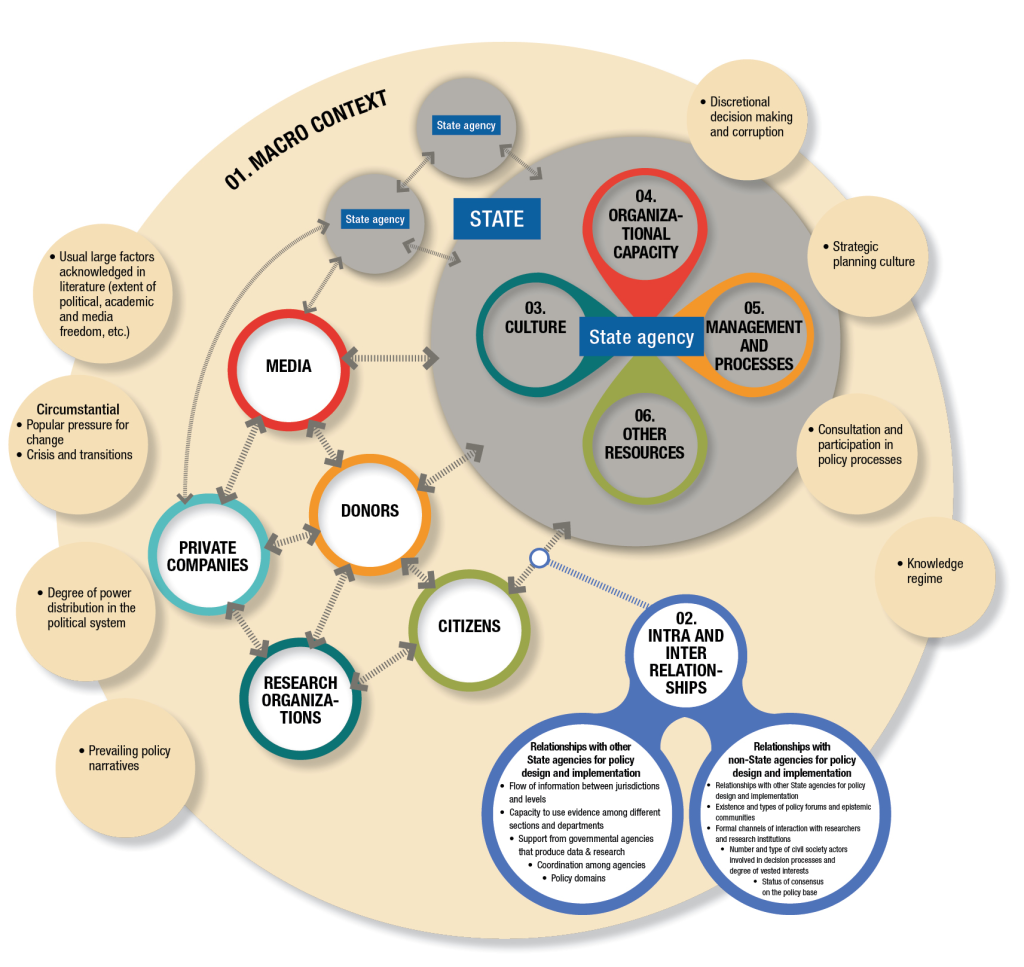
Knowledge into policy: Going beyond “Context matters”
In an article first published in the Politics and Ideas blog, Vanesa Weyrauch shares her experience of writing a new study ‘Going beyond “Context matters”’, which aims to promote the use of knowledge into policy. This framework is written in collaboration with INASP.
After several months of reading, interviewing people and systematizing experiences from policymakers aiming to promote the use of knowledge in policy, we are happy to share our conceptual framework Knowledge into Policy: Going beyond ‘context matters‘. This framework intends to be a lens to help policymakers, researchers, practitioners and donors better define windows of opportunity in different public institutions to focus efforts on promoting better interaction between knowledge and policy. In few weeks, we would present a practical paper, which proposes concrete ways in which the framework could be used.
What is the framework?
The framework comprises of six facets or ‘dimensions’ of context that any government institution aiming to improve the use of knowledge in public policy (as well as those working with these agencies) should consider carefully. These six dimensions fall into two categories: external and internal. The first two external dimensions are (1) macro-context, and (2) intra- and inter-relationships with state and non-state agents. The four internal dimensions are (3) culture; (4) organizational capacity; (5) management and processes; and (6) core resource.
All these dimensions and their sub-dimensions clearly confirm that context matters. It matters in a specific way and across several different dimensions. The links between these dimensions are various and changing. Clearly a macro-context that hinders the use of knowledge in public policy – such as, restrictions on freedom of expression, or a lack of quality and policy-relevant research – will significantly limit the potential of internal changes that a new leadership might promote (for instance, attempting to create a culture that values research). The same applies to the type, interests, and objectives of external stakeholders: if most stakeholders value the role of knowledge, and produce and use it to inform their own decision-making processes, it is more likely a governmental agency will take this into account.
As explained in the section ‘Our focus’, we also believe that there is important room to maneuver within each governmental institution to inform its decision and implementation processes with existing or new knowledge.
Leadership – a catalyst for change
In the course of the study, leadership emerged as one of the key “sub-dimensions” that can catalyze effective improvements in culture, organizational capacity, processes and resources to strengthen evidence use. Therefore, the role of the individual agent, particularly when leveraged by a political setting that favors change, should not be underestimated when considering the institutional change. For instance, when supported by capable senior management, leadership can effectively create new working cultures and channel resources to establish new processes that incorporate and promote knowledge production.
Other important factors
Organizational culture is also significant. It can erode well-designed and well-intentioned management processes. Incentives and motivations should be carefully considered – as too, should the factors that influence them, such as values, judgments, experience and expertise, pressure groups, etc. This complexity means that any formal decision to promote better use of research in policy needs to be highly strategic.
In this sense, our framework aims to help users better assess their contexts in which they operate and, based on careful assessment, detect where the potential for change may be greater and barriers more significant. The intention is not for each user to go through the entire framework “lens” or pay attention to each and every dimension and factor. The framework has a promising set of practical applications for diverse audiences – from policymakers to researchers, donors to practitioners, among others. There are concrete uses that can emerge from conducting this type of analysis and for different types of actions: research, design of interventions, implementation of interventions, capacity building, and monitoring, evaluation and learning.
After reading this paper if you feel compelled to convert the framework into an effective tool to inform strategic decisions on how to promote change – we would encourage you to wait for the practical paper.
Last but not the least, this product is an evolving creature: we are certain that it will become more useful and more valuable as users collaborate by sharing new reflections and ideas and practices. To achieve change, every individual and organizational agent must make small steps together; we cannot do it alone. This framework and the upcoming practical knowledge product are one of P&I and INASP’s contributions to such collaborative change. We hope that others join us on this complex but promising path.


 Next Post
Next Post



Thanks Guest,
This framework is certainly intriguing. One would like to see the word Human Resources in this framework. Just the word. People are number one resource (their number, categories, skills mix, their commitment ….) . How can you find where to deliberately put this word? – People, Talent, Human Resource, Human Capital, men and women sometimes referred to as gender?
Dear Moses, you really make me re-think the name of one of the main Dimensions which is Organizational capacity and where people are clearly number one…probably since we are describing aspects of an organization we have come up with this words as one of the crucial ones that account for what an organization is and how it behaves. I´ll keep on pondering to see whether we can find another way of more clearly depicting the role of persons. Thanks very much for raising this important point!
Vanesa
Dear Vanesa, Appreciate your response. Will be very happy to see what you have come up with after your careful thoughts on the Organizational Capacity dimension. Otherwise good to hear from you. Moses